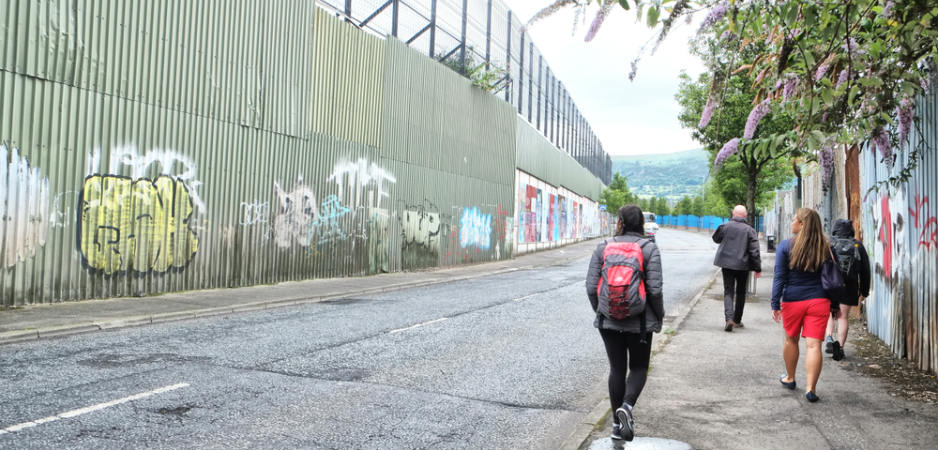A warning to Colombia is that peace, even after 20 years, is not guaranteed.
Colombians are just beginning to recover after a car bomb, planted by the country’s last remaining guerrilla group, the National Liberation Army (ELN), detonated in the capital city of Bogotá on January 17. The blast, which killed 21 people and injured dozens during a promotion ceremony at the General Santander police academy, evoked for many the fear of the “bad old days” of the 1990s, when bombs indiscriminately planted by guerrillas and drug traffickers wreaked havoc on the Andean nation. Amidst renewed fear and the desperate search for what motivated the bombing, Colombians may be forgiven if they missed the news of another car bomb that weekend, an ocean away in Northern Ireland.
While Colombian authorities were busy picking shrapnel from their streets, Northern Ireland faced a horror of its own when a car bomb planted by Irish Republican Army (IRA) exploded outside a courthouse in Derry (also known as Londonderry) on January 19. While no one was killed in the blast, the parallels between the bombings occurring in the same weekend — both carried out by members of organized rebel groups, both in countries trying to recover from decades of conflict — are striking. So as the Colombian government coordinates its response to the Bogotá bombing, it should look to Derry as a warning: Peace, even after 20 years, is not guaranteed.
It would not be the first time Colombia looked to the Irish for cues. The Good Friday Agreement, which ended decades of Northern Ireland’s Troubles in 1998, served as a model for Colombia’s most recent peace process with the Revolutionary Armed Forces of Colombia (FARC), the country’s oldest and largest guerrilla group until its demobilization in 2016. Former Colombian President Juan Manuel Santos has talked about how the improbable peace between the British and the IRA inspired his own quixotic peace negotiations. “I was in Belfast seeing how people are still trying to reconcile and it has been a great inspiration for me and for the peace process in Colombia,” he said in November 2016.
Irish politicians, trade unionists and human rights activists also played a more formal role in the peace process with the FARC, traveling between Belfast, Bogotá and Havana, where the negotiations were held, to share best practices and lessons learned from the Northern Irish process.
While Northern Ireland’s peace agreement may have served as a model for Santos, what happened after its ratification should instill trepidation among Colombians. Violence did not end as the agreement went into effect, as IRA dissidents refused to accept the compromises made by their party leaders at the negotiating table. This violence helped foment political polarization, and anti-agreement politicians have tried repeatedly to dismantle various aspects of the deal. This situation should sound familiar to those in Colombia, where FARC dissidents continue to rule parts of the countryside, and where voters rejected an initial peace deal by less than one percentage point.
Today, the sectarianism that drove the Irish conflict continues to flourish. There are more peace walls segregating communities in cities like Belfast than when the Good Friday Agreement was signed. The power-sharing agreement between the Democratic Unionist Party (DUP) and the (Republican) Sinn Féin in the Northern Irish Assembly that served as the cornerstone of the 1998 peace deal has effectively fallen apart. Disagreements over legislation forced the government into gridlock in January 2017, and the continuing impasse has left Northern Ireland without a functioning parliament for over two years.
Finally, Britain’s impending exit from the European Union threatens to completely unravel the Good Friday Agreement by reestablishing a hard border between Northern Ireland and the Republic of Ireland, which is part of the EU. This year’s car bomb in Derry is only the most apparent example of how fragile Northern Ireland’s peace remains, over 20 years after the conflict officially ended.
Of course, many Colombians don’t need to look across the Atlantic to know that peace is not guaranteed. Killings are on the rise in many areas of the country, where community leaders and activists are assassinated for supporting implementation of the Havana peace accords. But for others, the bombing in Bogotá may have been a wake-up call. The country’s leaders must think carefully about how to respond to the ELN’s attack. The Colombian government has already called off peace talks with the rebel group, but it cannot lose sight of its commitments to peace with the FARC.
As the Derry bombing illustrates, halting implementation of the peace accord today would set Colombia up for continued violence decades from now. The Colombian government must never stop working to maintain and build peace. Colombia — and Ireland — already have too many victims.
The views expressed in this article are the author’s own and do not necessarily reflect Fair Observer’s editorial policy.
Support Fair Observer
We rely on your support for our independence, diversity and quality.
For more than 10 years, Fair Observer has been free, fair and independent. No billionaire owns us, no advertisers control us. We are a reader-supported nonprofit. Unlike many other publications, we keep our content free for readers regardless of where they live or whether they can afford to pay. We have no paywalls and no ads.
In the post-truth era of fake news, echo chambers and filter bubbles, we publish a plurality of perspectives from around the world. Anyone can publish with us, but everyone goes through a rigorous editorial process. So, you get fact-checked, well-reasoned content instead of noise.
We publish 2,500+ voices from 90+ countries. We also conduct education and training programs
on subjects ranging from digital media and journalism to writing and critical thinking. This
doesn’t come cheap. Servers, editors, trainers and web developers cost
money.
Please consider supporting us on a regular basis as a recurring donor or a
sustaining member.
Will you support FO’s journalism?
We rely on your support for our independence, diversity and quality.






